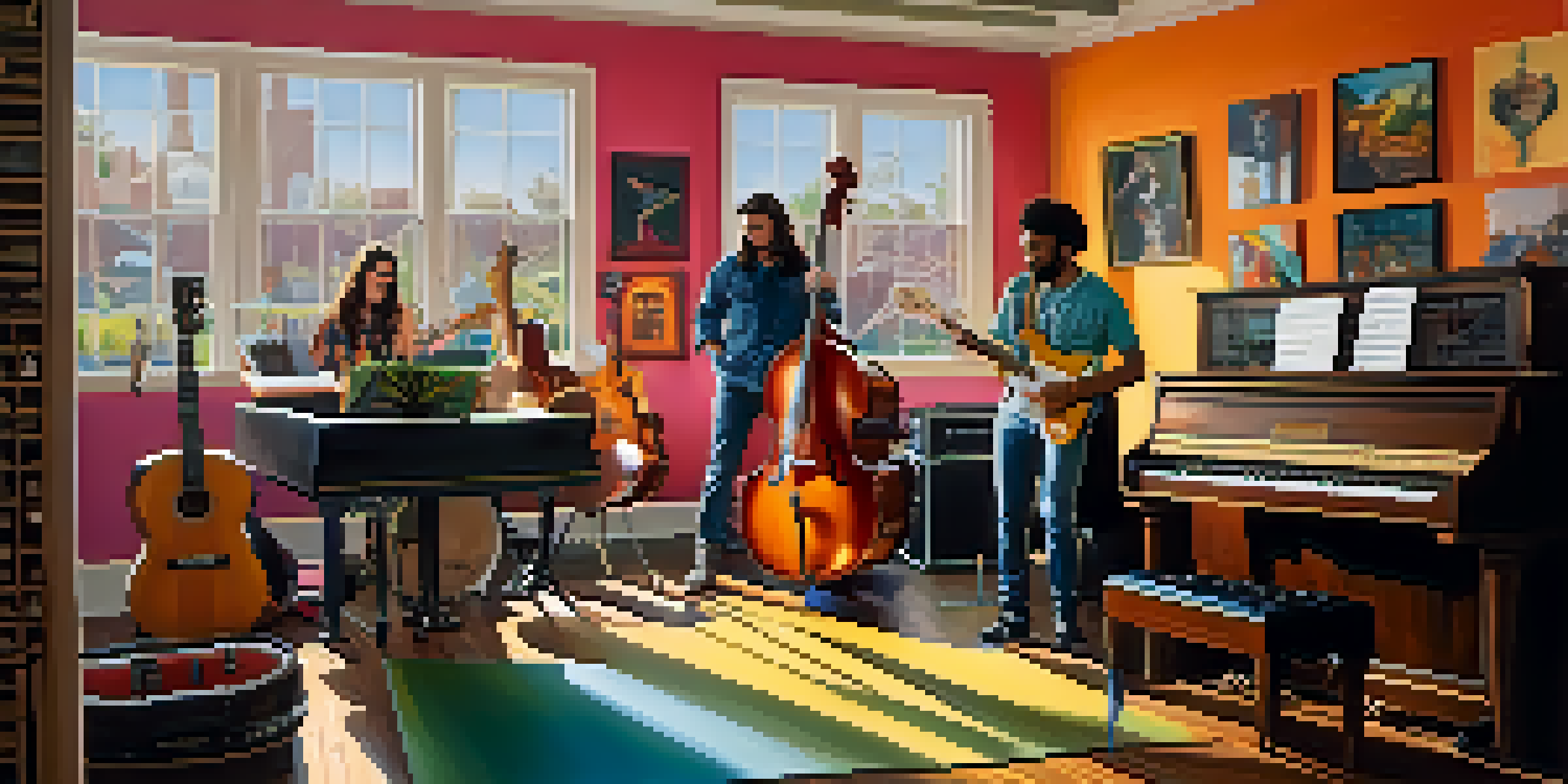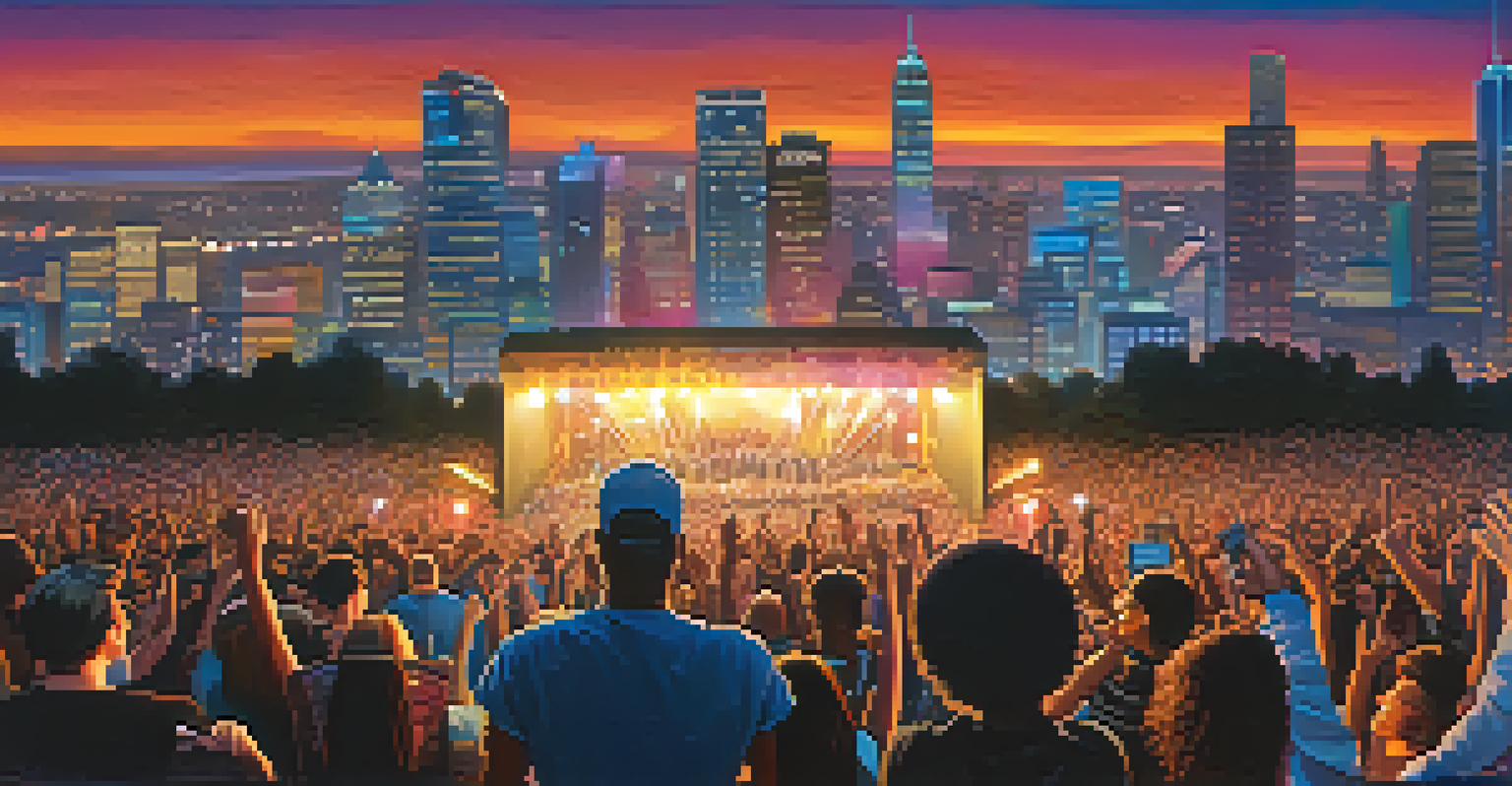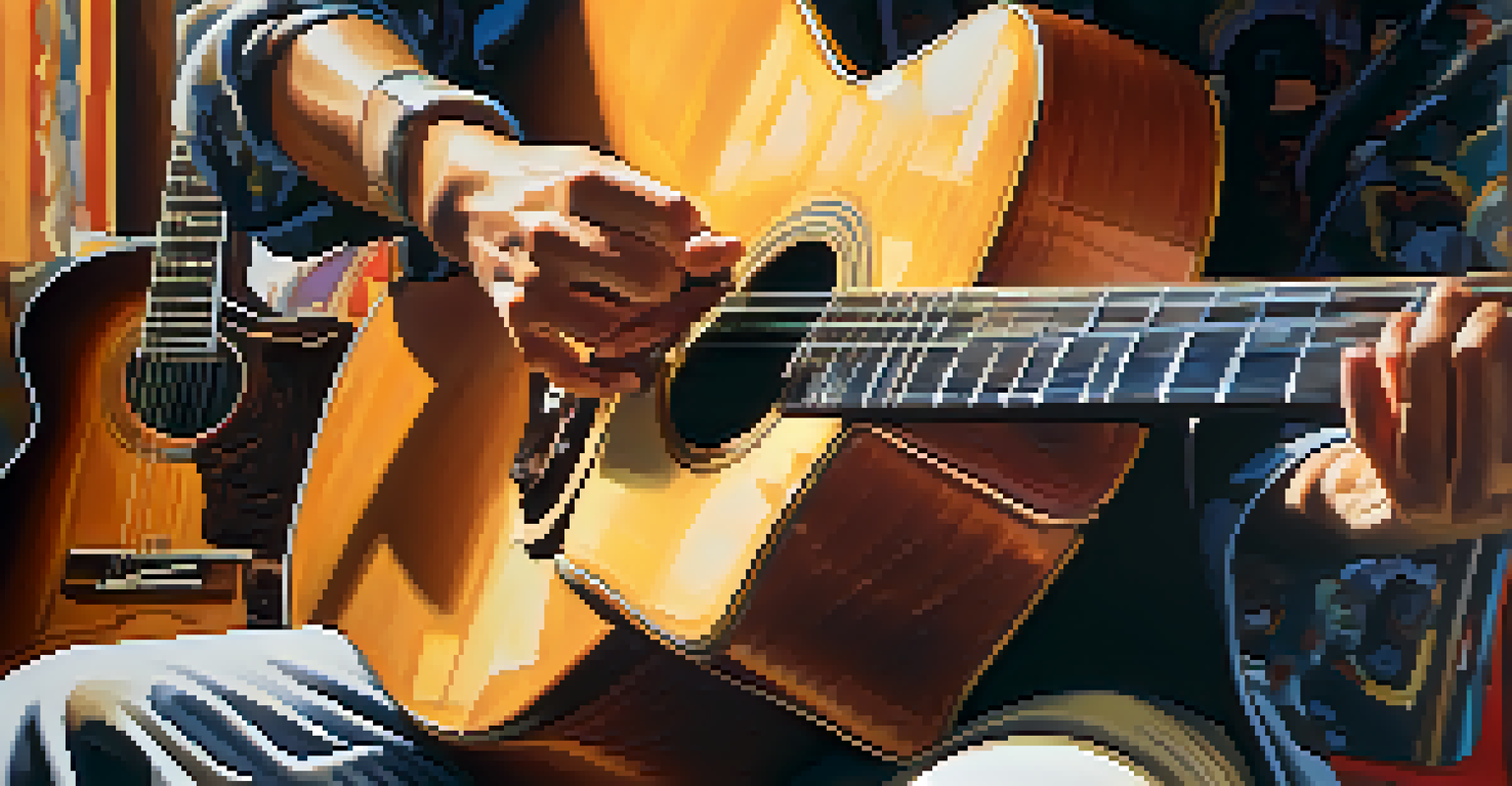Cross-Genre Guitar Collaborations: A Musical Journey

Understanding Cross-Genre Collaborations in Music
Cross-genre collaborations occur when artists from different musical styles come together to create something new and exciting. This blending of genres can often lead to innovative sounds that push the boundaries of traditional music. For example, think about how country music has fused with rock to produce hits that appeal to both audiences.
Music is the universal language of mankind.
These collaborations not only showcase the versatility of musicians but also highlight the creativity that emerges when diverse influences meet. The result is often a richer, more textured sound that attracts listeners who might not typically enjoy one of the genres involved. It’s a beautiful reminder that music is a universal language, transcending barriers and connecting people.
Moreover, cross-genre projects can breathe new life into both artists’ careers, drawing in new fans and reviving interest in their existing work. Just as a painter mixes colors to create a unique palette, musicians blend their styles to enrich the musical landscape.
Iconic Examples of Cross-Genre Guitar Collaborations
Many iconic cross-genre collaborations have left a lasting impact on the music industry. One notable example is the partnership between rapper Jay-Z and rock band Linkin Park. Their remix album 'Collision Course' showcased how hip-hop and rock can complement each other, leading to massive hits like 'Numb/Encore.'

Another unforgettable instance is the collaboration between guitarist Eric Clapton and blues legend B.B. King. Their album 'Riding with the King' beautifully marries Clapton's rock roots with King's soulful blues, creating a timeless sound that resonates with fans across generations. These collaborations often break away from traditional genre expectations, allowing artists to explore new musical territories.
Cross-Genre Collaborations Expand Sound
Artists from different genres come together to create innovative music, enriching the listening experience for diverse audiences.
In today’s digital age, platforms like YouTube have made it easier for musicians from different backgrounds to collaborate. Artists can connect globally, leading to fresh and innovative projects that might not have been possible before. This openness has given rise to a new wave of creativity, constantly evolving the music scene.
The Role of Technology in Music Collaborations
Technology has revolutionized how artists collaborate, especially across genres. With the rise of digital audio workstations (DAWs) like Ableton and Logic Pro, musicians can work together from anywhere in the world. This democratization of music production means that a guitarist in Nashville can easily collaborate with a producer in London.
Creativity takes courage.
Online platforms also allow artists to share ideas, tracks, and feedback instantaneously. Social media has created a sense of community where musicians can discover each other’s work and reach out for potential collaborations. This interconnectedness has led to a surge in innovative projects that might never have happened otherwise.
Furthermore, technology enables artists to experiment with sounds and styles that may be outside their comfort zone. With the click of a button, a guitarist can add elements of jazz, hip-hop, or electronic music to their track, expanding their sonic palette and appealing to a wider audience.
The Creative Process Behind Cross-Genre Collaborations
The creative process in cross-genre collaborations can be both exhilarating and challenging. Artists often start by discussing their musical backgrounds and influences, which helps establish a common ground. This initial conversation sets the tone for the collaboration, allowing each musician to bring their unique flair to the project.
As ideas flow, the artists experiment with different sounds and techniques, often blending their genres in unexpected ways. For instance, a country guitarist might incorporate bluegrass fingerpicking into a rock ballad, creating a sound that is fresh and captivating. This exploration often leads to unexpected musical discoveries that can shape the final product.
Technology Enhances Music Partnerships
Digital tools and platforms facilitate collaboration among musicians worldwide, allowing for creative exploration and experimentation.
Once the groundwork is laid, the artists work together to refine their tracks, balancing each other's contributions while ensuring that the final piece reflects their combined vision. It’s a collaborative dance, where both artists must remain open-minded and flexible, allowing their creativity to flourish and shine.
The Impact of Cross-Genre Collaborations on Fans
Cross-genre collaborations often have a profound impact on fans, as they introduce listeners to new styles of music. Fans of one genre may find themselves drawn to the other, broadening their musical horizons. This cross-pollination helps break down genre barriers, fostering a more inclusive music community.
Moreover, these collaborations can create shared experiences among fans, who come together to celebrate the merging of styles. Imagine attending a concert where rock and hip-hop artists perform together; the energy in the crowd is electric as diverse fans unite for a common love of music. This sense of community can be a powerful force in the music landscape.
Additionally, these collaborations often spark discussions and debates among fans about musical authenticity and genre blending. This dialogue encourages listeners to think critically about music and its evolution, engaging them in a way that traditional genre-specific music might not.
Challenges in Cross-Genre Collaborations
Despite the excitement of cross-genre collaborations, they come with their own set of challenges. One significant hurdle is the potential for creative differences, as artists may have contrasting visions for their music. Finding a balance between their distinct styles can be tricky, and sometimes it leads to disagreements.
Another challenge is the audience's reception. Fans of one genre might not always embrace the fusion with another, leading to skepticism or backlash. For example, a metal guitarist collaborating with a pop singer may face criticism from purists who feel that the essence of their favorite genre is being diluted.
Challenges in Collaboration Exist
While cross-genre collaborations can be rewarding, they also face creative differences and audience reception challenges.
Additionally, logistical issues can arise, such as scheduling conflicts or difficulties in communication. However, overcoming these challenges often results in a more rewarding experience, as artists learn and grow from the process, ultimately leading to a more robust and dynamic collaboration.
The Future of Cross-Genre Guitar Collaborations
As the music industry continues to evolve, the future of cross-genre guitar collaborations looks promising. With emerging genres and hybrid styles gaining popularity, musicians are more inspired than ever to experiment and collaborate. This trend is likely to lead to even more groundbreaking partnerships that challenge conventional musical boundaries.
Furthermore, the global nature of today's music scene encourages artists to draw from diverse cultural influences. Collaborations that incorporate world music elements into mainstream genres will likely continue to flourish, enriching the musical landscape and captivating audiences worldwide. Think about the fusion of Afrobeat with pop, which has garnered immense popularity in recent years.

Ultimately, the spirit of collaboration will remain at the heart of music, as artists seek to connect with one another and their audiences. As they continue to explore new sounds and styles, the future of cross-genre collaborations promises to be an exciting journey for both musicians and fans alike.